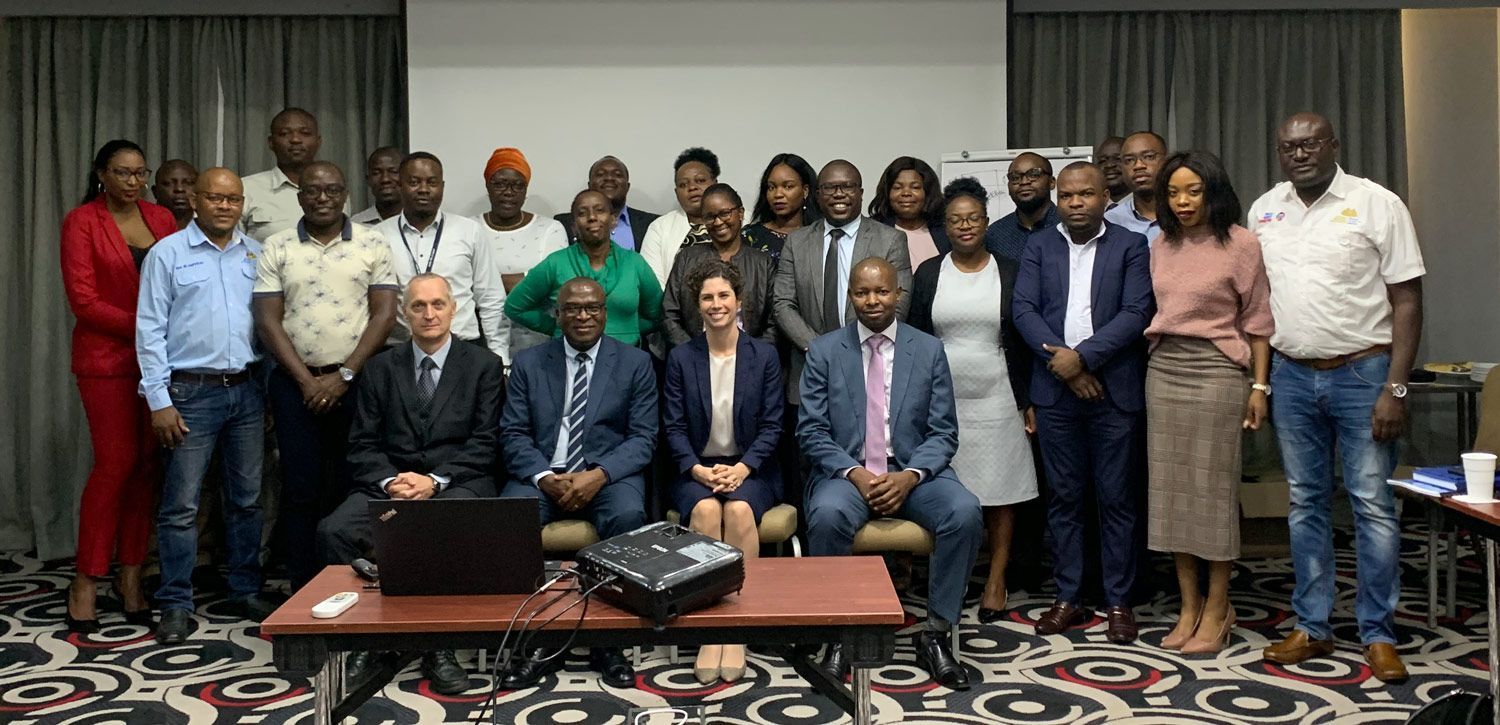IMPACT STORY: Boosting Zambia’s Mining Revenue through Tax Audits, Transfer Pricing Legislation and License Valuation
To ensure the country benefits fairly from its mining resources, the Zambia Revenue Authority worked with ATAF, the IGF and the OECD to improve revenue collection in the sector.

Participants and facilitators at a 2020 IGF-OECD workshop in Zambia.
The Challenge
Zambia, rich in natural resources such as copper, cobalt, and manganese, has long relied on its mining sector to fuel economic growth. Copper has been a backbone of the country’s economy, accounting for 70% of its exports by value in 2023. The country faces fiscal constraints due to high levels of debt, which affect the government’s ability to address income inequality and other social challenges. To ensure the country benefits fairly from its mining resources, the Zambia Revenue Authority (ZRA) has worked with the African Tax Administration Forum (ATAF), the Intergovernmental Forum on Mining, Minerals, Metals and Sustainable Development (IGF) and the Organisation for Economic Cooperation and Development (OECD) to improve revenue collection in the sector, which is often characterized by cross border intra-group transactions, transfer pricing risks, opaque mineral pricing, and challenges in valuing mining licenses.
Our Role
To tackle these challenges, the IGF, the ATAF, and the OECD launched a deep dive technical assistance program focused on mining taxation. Spanning from 2019 to 2023, this multi-year effort offered in-depth, sustained collaboration, allowing for comprehensive and targeted support to the ZRA to effectively tackle the complex tax issues faced by the country.
Our primary goal was to enhance the ZRA’s ability to audit international tax cases based on risks in the mining sector. We began by identifying high-risk transfer pricing cases among mining firms and chose to focus intensively on the large mining companies. To drive progress, we provided the ZRA’s mining audit unit and the international taxation unit with specialized training on transfer pricing financial transactions risks and on the pricing of copper and manganese.
At the same time, we played a crucial role in updating Zambia’s legal and policy framework. We assisted the ZRA and the Ministry of Finance and National Planning in revising their transfer pricing rules for mineral sales, empowering them to access third-party sales agreements and use publicly quoted prices to counteract complex tax avoidance schemes and ensure fairer compensation for mineral extraction. We also clarified how to treat premiums and discounts to determine the correct adjustments for tax purposes to the quoted prices.
In addition, we supported the ZRA in adopting new methods for valuing mining licences to collect a correct amount of property transfer tax and developed internal guidance on how to apportion royalties for blended materials.
Our Impact
Tax Audit Support and Transfer Pricing
The collaborative efforts of IGF, ATAF, OECD, and Zambian authorities have significantly increased Zambia’s mining revenue collection. Our capacity-building program enabled the ZRA to undertake transfer pricing audits in the copper mining sector. These are ongoing and have revealed that potentially millions of dollars in mining taxes were at risk. We are continuing to support the Zambian authorities in bringing these audits to a conclusion. The updated legal frameworks and improved mining audit practices also helped contribute to the collection of USD 6 million in property transfer tax and USD 58 million in mining corporate income tax revenue between 2020 and 2022. The USD 58 million represents approximately 10% of the average annual mining corporate income tax in recent years.
Mining Licence Valuation
Zambia’s new methodology for valuing mining licences also uncovered possible significant underreporting. For example, one mining licence was found to be undervalued by nearly 55%, which could have led to massive tax losses. The ZRA has now adopted this new methodology as one of the valuation methods, ensuring more accurate assessments and safeguarding future revenue.
Tax Audit Support and Transfer Pricing
The collaborative efforts of IGF, ATAF, OECD, and Zambian authorities have significantly increased Zambia’s mining revenue collection. Our capacity-building program enabled the ZRA to undertake transfer pricing audits in the copper mining sector. These are ongoing and have revealed that potentially millions of dollars in mining taxes were at risk. We are continuing to support the Zambian authorities in bringing these audits to a conclusion. The updated legal frameworks and improved mining audit practices also helped contribute to the collection of USD 6 million in property transfer tax and USD 58 million in mining corporate income tax revenue between 2020 and 2022. The USD 58 million represents approximately 10% of the average annual mining corporate income tax in recent years.
Mining Licence Valuation
Zambia’s new methodology for valuing mining licences also uncovered possible significant underreporting. For example, one mining licence was found to be undervalued by nearly 55%, which could have led to massive tax losses. The ZRA has now adopted this new methodology as one of the valuation methods, ensuring more accurate assessments and safeguarding future revenue.
Manganese Pricing and Royalty Assessment
Finally, the revamping of the manganese valuation policy contributed to the collection of USD 6 million in export tax revenue from manganese ore. This is for the period 2019 to 2022. This success, along with new guidelines for apportioning royalties on blended materials, has strengthened Zambia’s approach to taxing its mineral resources and helped ensure that the benefits of mining are more widely shared.
Conclusion
Through targeted support and capacity building, Zambia has made significant progress in strengthening mining revenue collection. These efforts have not only increased government revenues but also laid the groundwork for more transparent and equitable management of the country’s mineral resources.










